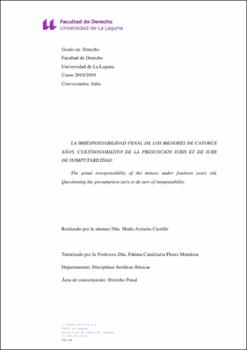La irresponsabilidad penal de los menores de catorce años. Cuestionamiento de la presunción iuris et de iure de inimputabilidad
Autor
Arrocha Castillo, MaríaFecha
2019Resumen
The present research project puts in question the presumption iuris et de
iure of unimputability of the unfair penal acts that children under fourteen
years old may have committed, established by the Spanish legislator with
the approval of the Organic law 5/2000, of January 12, regulating the
criminal responsability of minors due to the exclusive application of the
biological criterion and the correlative referral of these to the Organic law
1/1996, of January 15, on the legal protection of minors. For this reason, the
study has been carried out from a doctrinal and legal perspective, not being
possible to go to a jurisprudential panorama, due to the fact that exemption
of criminal responsability of these people precisely implies their exclusion
of the penal process of minors of the LORPM.
The main objective of this document will be to conclude whether the
biological criterion is the most appropiate in determining the unimputability
of minors who do not reach fourteen years old or whether, on the other
hand, it should be raised a reform within the legal institutions either by
lowering the minority of the criminal age or by abandoning the voluntary
note which characterizes the administrative measures of the child protection
system, or by maintaining this minimun limit, but by introducing the
criterion of discernment proper to our previous criminal systems in order to
welcome again the presumption iuris tantum, at least in those assumptions
in wich this would be advisable.
This purely doctrinal debate on the minimun and maximum limits to
demand criminal responsibility for the minor has become a problem that
has undoubtely been gradually settling in our country with every legislative
advance in the matter and by which, even public opinion seems to show interest largely due to the increase in the social alarm between the
population. El presente trabajo de investigación pone en cuestión la presunción iuris et
de iure de inimputabilidad de los injustos penales que hayan podido
cometer los niños menores de catorce años, establecida por el legislador
español con la aprobación de la Ley Orgánica 5/2000, de 12 de enero,
reguladora de la responsabilidad penal de los menores, por aplicación
exclusiva del criterio biológico y la correlativa remisión de estos a la Ley
Orgánica 1/1996, de 15 de enero, de Protección Jurídica del Menor. Por
esta razón, el estudio se realiza desde una perspectiva doctrinal y legal, no
pudiéndose acudir a un panorama jurisprudencial, dado que la exención de
responsabilidad penal de estos sujetos comporta precisamente su exclusión
del proceso penal de menores de la LORPM.
El principal objetivo de este documento será concluir si el criterio biológico
resulta el más adecuado en cuanto a determinar la inimputabilidad de los
menores de edad que no alcancen los catorce años, o si, por el contrario,
debe de ser planteada una reforma dentro de las instituciones legales, ya sea
rebajando la minoría de edad penal, abandonando la nota de voluntariedad
que caracteriza a las medidas administrativas del sistema de protección de
menores, o bien, manteniendo el límite mínimo, pero introduciendo el
criterio del discernimiento propio de nuestros sistemas penales anteriores,
con objeto de acoger de nuevo la presunción iuris tantum, al menos en
aquellos supuestos en que así se aconsejare.
Este debate puramente doctrinal sobre los límites mínimos y máximos para
exigir responsabilidad penal al menor se ha convertido en una problemática
que, sin duda, se ha ido asentando paulatinamente en nuestro país con cada
avance legislativo en la materia y por la que, incluso, hasta la opinión
pública parece mostrar interés debido, en gran parte, al aumento de la
alarma social entre la población.





